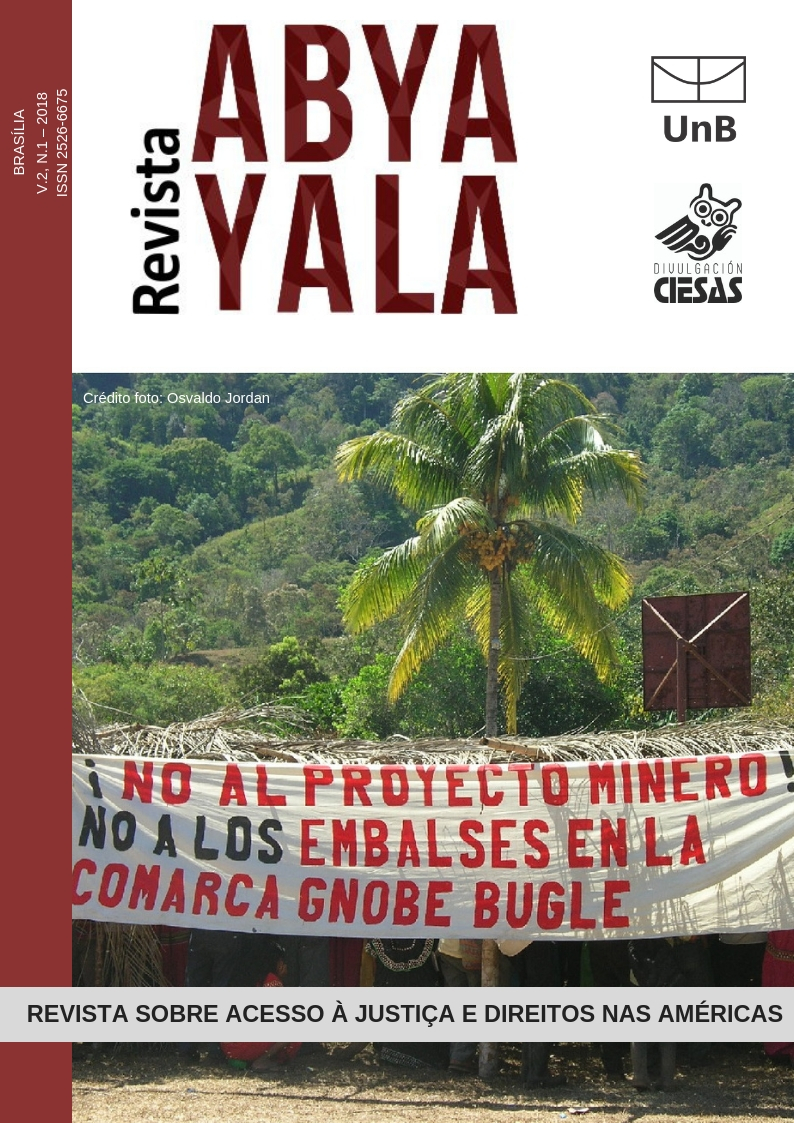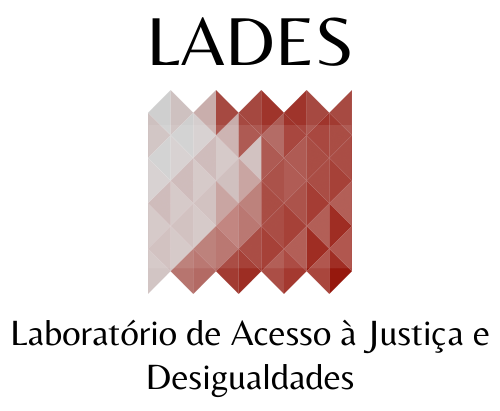Internecine between the Indian State and the Adivasis (indigenous people), under Neo-Liberalism: a case of Lanjigarh resistance movement
A case of Lanjigarh Resistance Movement
DOI:
https://doi.org/10.26512/abyayala.v2i1.10695Palavras-chave:
Mobilização coletiva, movimentos de protesto tribais, novos movimentos sociais, sociedade civil, neoliberalismoResumo
RESUMO EM PORTUGUÊS: O movimento anti Vedanta em Lanjigarh abalou o distrito de Kalahandi, no interior do estado indiano de Odisha. Ele foi um movimento ferozmente combatido (2002-2014) pelos Adivsis (Dongria Kondh) contra o estado de Odisha e VAL, o metal pesado baseado em mineração MNC, licenciado sob a política neoliberal. O projeto havia desalojado 302 famílias adivasis e minou as montanhas de Niyamgiri, à s quais os Adivasis estavam ligados para o seu sustento e propósitos religioso-culturais. Os deslocados se mobilizaram em torno de questões de ameaças culturais, ambientais e medidas inadequadas de R&R contra a perda de meios de subsistência e o habitat natural. O artigo analisa empiricamente: (i) as ameaças impostas à identidade Adivasi por este processo de modernização, pondo em risco seus padrões culturais, relações sociais, organizações econômicas e ecossistema primitivo; (ii) os paradoxos inerentes a esse discurso de desenvolvimento baseado no neoliberalismo, a medida em que o estado impõe um determinado modelo de desenvolvimento (ultrapassando o direito dos sujeitos de experimentar o desenvolvimento de forma diferente); (iii) como a sociedade civil orientou o movimento para assegurar a implementação de disposições legais relevantes, tais como o quinto cronograma da constituição, o artigo 244, PESA 1996, FRA 2006 e os Odisha scheduled areas act 1956, para proteger os adivasis. Conclui que o estado está sendo forçado a dividir espaço com a sociedade civil como resultado do neoliberalismo.
Downloads
Referências
AMNESTY INTERNATIONAL , Executive Summary of Report: Don’t Mine Us out of Existence: Bauxite Mine and Refinery Devastate Lives in India, Index: ASA 20/004/2010, Tuesday 9 February, 2010. International Secretariat, Amnesty International, 1 Easton St., London WC1X 0DW, UK. https://www.amnesty.org/download/Documents/36000/asa200042010en.pdf
BABOO, Balgovind, “State Policies and People's Response: Lessons from Hirakud Dam”, Economic and Political Weekly, Vol. 26, No. 41 (Oct.12), pp. 2373-75 and 2377-79. 1991.
BANERJEE, Parthasarathi “West Bengal: Land Acquisition and Peasant Resistance at Singur”, Economic and Political Weekly, 41(16), pp. 4718”“20. 2006.
BAVISKAR, Amita, “In the Belly of the River, Tribal Conflict over Development in the Narmada Valley”, Delhi, Oxford University Press, 1995. 286p.
http://www.cseindia.org/node/1680
COHEN, Jean. “Strategy or Identity: New Theoretical Paradigm and Contemporary Social Movements”, Social Research, Vol 52, No 4; pp. 663-716. 1985.
CROOK, Stephen, Jan Pakulski and Malcolm Waters, Postmodernization: Change in Advanced Society, Delhi, Sage. 1994.
D’MONTE, Darryl, “Green at the Grassroots”, Seminar, Vol 355, March, pp.16-20. 1989.
DWIVEDI, Ranjit, “Displacement, Risks and Resistance: Local perceptions and Actions in the Sardar Sarovar”, Development and Change, Vol. 30. pp. 43-78. 1999.
-------------, Conflict and Collective Action: The Sardar Sarovar Project in India, Routledge. 2006. 402p.
EDWARDS, Michael and Hulme David, “Scaling-up the Development Impacts of NGOs: Concepts and Experiences”, in Michael E and David H (ed) Making a Difference: NGOs and Development in a Changing World, London, Earth Scan, 1992. pp.13-27.
FRANK, Andre Gunder, and Fuentes Marta, “Nine Theses on Social Movement”, Economic and Political Weekly Vol. XXII, No.35, Aug 29, pp. 1503-1510. 1987.
FUENTES, Marta and Frank, Andre Gunder, “Ten theses on Social Movement”, World Development, Vol. XVII (2), pp.79-91. 1989.
http://www.indianexpress.com/news/environment-body-cancels-goahead-to-vedanta/683338/
http://www.mydigitalfc.com/economy/centre-issues-2-showcause-notices-vedanta-521
http://news.bbc.co.uk/2/hi/8500997.stm
OLIVER-SMITH, Anthony, Displacement, Resistance and the Critique of Development: From the Grassroots to the Global, Final report prepared for ESCOR R7644 and Research Programme on Development Induced Displacement and Resettlement, Refugee Studies Centre, University of Oxford. 2001.
OOMMEN, Tharaileth Koshy, “Multiple Modernities and the Rise of New Social Movements: The case of India”, Indian Social Science Review, Vol.3, No.1, Jan, pp 1-16. 2001.
PADEL, Felix and Samarendra Das, “Orissa’s Highland Clearances: the Reality gap in R& R”, Social Change, Vol 38, No 4, pp, 576-608, 2008.
PATEL, Sujata et al, Bheeta Maati- Our Soil, Our Earth, Our Home: A report on Missile Base and struggle, Delhi, PUDR, August, Record No. CL 010015, 1988.
PATEL, Sujata, “Agni, Cyclone and Baliapal Agitation”, Economic and Political Weekly, Vol. 24, No. 25, 24 Jun. pp. 1381-1382. 1989.
PEOPLE’S TRIBUNAL, “Nandigram: What Really Happened?” (Report on Nandigram), All India Citizens Initiative, Delhi, Daanish Books, 2008. 102p.
ROUTLEDGE, Paul, Terrains of Resistance: Nonviolent Social movements and contestations of place in India, West Port, Praeger Publishers, Ch-3, pp39-74. 1993.
SAMAL, Kishor, “Shrimp Culture in Chilika Lake: Case of Occupational Displacement of Fishermen”, Economic and Political Weekly, Vol. 37, No. 18 (May 4-10), pp. 1714-1718. 2002
SARKAR, Abhirup, 2007, “Development and Displacement”. Economic and Political Weekly, Vol 42, No. 16, pp16-21, 2006.
THE TIMES OF INDIA (TOI), “ONGC Won’t Counter Vedanta’s $10.bn offer”, Kanpur edition, d. 25.9.2010, p.13.
TOURAINE, Alain. “An Introduction to the Study of Social Movements”, Social Research, Vol.52, No 4, pp.749-788. 1985.
Downloads
Publicado
Como Citar
Edição
Seção
Licença
Copyright (c) 2018 Abya-yala: Revista sobre Acesso à Justiça e Direitos nas Américas

Este trabalho está licenciado sob uma licença Creative Commons Attribution-NonCommercial 4.0 International License.
O envio de contribuições para Abya Yala implica a cessão de direitos autorais e de publicação à Revista, observando a Atribuição-NãoComercial 4.0 Internacional (CC BY-NC 4.0) adotada.
O conteúdo dos textos submetidos à revista e por ela publicados serão de inteira responsabilidade de seus respectivos autores.
Copyright: https://creativecommons.org/licenses/by-nc/4.0/deed.pt_BR


 Este trabalho está licenciado como Atribuição Não Comercial 4.0 Internacional (CC BY-NC 4.0)
Este trabalho está licenciado como Atribuição Não Comercial 4.0 Internacional (CC BY-NC 4.0) 








